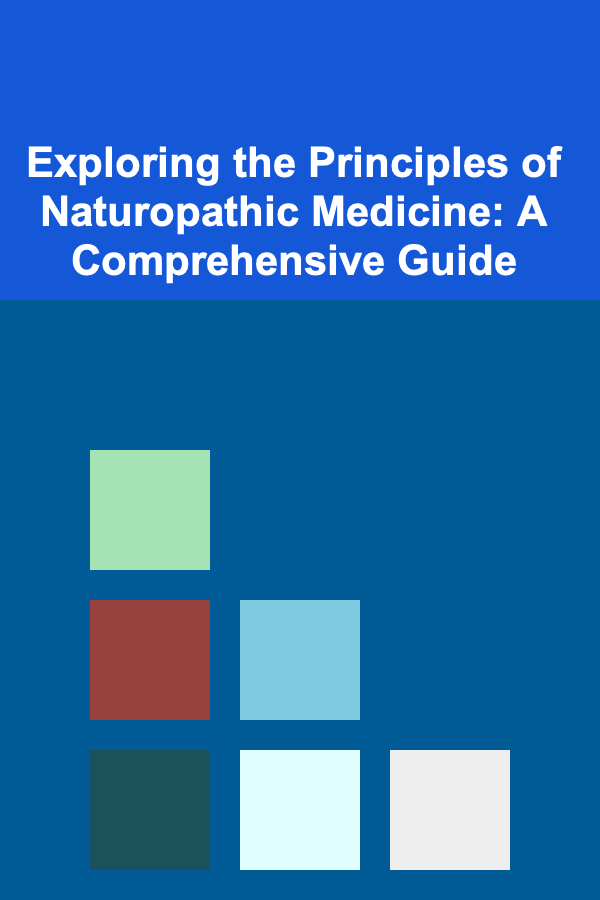
Exploring the Principles of Naturopathic Medicine: A Comprehensive Guide
ebook include PDF & Audio bundle (Micro Guide)
$12.99$7.99
Limited Time Offer! Order within the next:

Naturopathic medicine is a distinct primary health care profession, emphasizing prevention, treatment, and optimal health through the use of therapeutic methods and substances that encourage individuals' inherent self-healing process. The philosophy of naturopathic medicine embraces a holistic approach, acknowledging the interconnectedness of the physical, mental, emotional, and spiritual aspects of health. This approach goes beyond simply alleviating symptoms and seeks to address the root causes of illness, promoting long-term well-being and vitality. Understanding the principles of naturopathic medicine is crucial for anyone seeking a more integrated and patient-centered approach to healthcare. This exploration will delve into each principle, providing context, examples, and practical applications to illuminate their profound impact on health and healing.
The Core Principles of Naturopathic Medicine
Naturopathic medicine is guided by six fundamental principles, which serve as the foundation for its philosophy and practice. These principles are:
- The Healing Power of Nature (Vis Medicatrix Naturae): This principle recognizes the inherent self-healing abilities of the body.
- Identify and Treat the Cause (Tolle Causam): Naturopathic doctors seek to identify and remove the underlying causes of illness, rather than simply suppressing symptoms.
- First Do No Harm (Primum Non Nocere): Naturopathic practitioners prioritize the use of therapies that are safe and effective, minimizing the risk of harm.
- Treat the Whole Person (Tolle Totum): Naturopathic medicine considers the individual as a whole, taking into account their physical, mental, emotional, genetic, environmental, and social factors.
- Doctor as Teacher (Docere): Naturopathic doctors educate their patients about health and wellness, empowering them to take an active role in their own care.
- Prevention (Preventare): Naturopathic medicine emphasizes disease prevention through lifestyle modifications, dietary changes, and other natural therapies.
1. The Healing Power of Nature (Vis Medicatrix Naturae)
This principle, often referred to as Vis Medicatrix Naturae, acknowledges the body's innate capacity to heal itself. Naturopathic doctors believe that the body possesses an inherent wisdom and intelligence that guides it towards homeostasis and health. This inherent ability is not merely a passive process but an active and dynamic response to internal and external stressors.
The role of the naturopathic doctor is to support and facilitate this natural healing process by identifying and removing obstacles to healing, providing the body with the necessary nutrients and resources, and stimulating the body's own healing mechanisms. This might involve addressing nutritional deficiencies, managing stress, optimizing sleep, and supporting detoxification pathways. Instead of directly attacking the disease, the focus is on creating an environment within the body that is conducive to healing.
Examples of Applying the Vis Medicatrix Naturae:
- Wound Healing: The body's ability to repair damaged tissue is a prime example. A naturopathic approach might involve optimizing nutrition (e.g., adequate protein, vitamin C, zinc) to support collagen synthesis, reducing inflammation through diet and herbs, and ensuring proper hygiene to prevent infection, all supporting the natural healing process.
- Immune Response: When exposed to a pathogen, the body activates its immune system to fight off the infection. A naturopathic approach could involve supporting the immune system with nutrients like vitamin D, zinc, and vitamin C, as well as herbs like echinacea and elderberry, to enhance its ability to respond effectively. Rest and hydration are also critical for allowing the body to dedicate its resources to fighting infection.
- Stress Response: The body's response to stress, whether physical or emotional, triggers a cascade of hormonal and physiological changes. A naturopathic approach might involve stress management techniques like meditation, yoga, and deep breathing exercises, as well as adaptogenic herbs like ashwagandha and rhodiola, to help the body adapt to stress and maintain balance.
This principle underscores the importance of working with the body, rather than against it. By understanding the body's natural healing processes, naturopathic doctors can develop personalized treatment plans that support and enhance these processes, leading to more sustainable and effective healing.
2. Identify and Treat the Cause (Tolle Causam)
Tolle Causam, meaning "identify and treat the cause," is a cornerstone of naturopathic medicine. This principle emphasizes the importance of looking beyond the symptoms and addressing the underlying factors that are contributing to the illness. Simply suppressing symptoms may provide temporary relief, but it does not address the root cause of the problem and may even mask more serious underlying conditions.
Identifying the cause requires a thorough investigation, including a detailed medical history, physical examination, and potentially laboratory testing. Naturopathic doctors consider a wide range of factors that can contribute to illness, including:
- Nutritional Deficiencies: Lack of essential vitamins, minerals, and other nutrients.
- Environmental Toxins: Exposure to pollutants, pesticides, heavy metals, and other toxins.
- Lifestyle Factors: Poor diet, lack of exercise, chronic stress, and inadequate sleep.
- Genetic Predisposition: Inherited tendencies that may increase the risk of certain conditions.
- Emotional and Mental Factors: Stress, anxiety, depression, and unresolved trauma.
- Structural Imbalances: Misalignment of the spine or other musculoskeletal problems.
- Infections: Chronic or unresolved infections.
Once the underlying cause is identified, the naturopathic doctor develops a treatment plan that addresses these factors. This may involve dietary changes, nutritional supplements, lifestyle modifications, herbal remedies, homeopathic medicines, and other natural therapies.
Examples of Applying Tolle Causam:
- Chronic Fatigue: Instead of simply treating the fatigue with stimulants, a naturopathic doctor would investigate potential causes such as adrenal fatigue, nutrient deficiencies (e.g., iron, vitamin B12), thyroid dysfunction, food sensitivities, or chronic infections. Treatment would then focus on addressing these underlying issues.
- Skin Eczema: Rather than just prescribing topical steroids to suppress the inflammation, a naturopathic doctor would investigate potential causes such as food allergies, gut dysbiosis (imbalance of gut bacteria), exposure to irritants, or stress. Treatment would focus on addressing these underlying triggers to reduce inflammation and heal the skin from within.
- Headaches: Instead of relying solely on pain medication, a naturopathic doctor would explore potential causes such as dehydration, caffeine withdrawal, muscle tension, food sensitivities, hormonal imbalances, or even structural issues in the neck. Treatment would aim to address these factors to reduce the frequency and intensity of headaches.
By focusing on the root cause of illness, naturopathic doctors aim to achieve long-term healing and prevent recurrence of the problem. This approach is more sustainable and empowering for the patient, as they become actively involved in understanding and addressing the underlying factors that are affecting their health.
3. First Do No Harm (Primum Non Nocere)
This principle, derived from the Hippocratic Oath, emphasizes the importance of using therapies that are safe and effective, minimizing the risk of harm to the patient. Primum Non Nocere is paramount in naturopathic practice and guides treatment decisions at every step.
Naturopathic doctors adhere to this principle by:
- Using the Least Force Necessary: Starting with gentle and less invasive therapies before resorting to more aggressive interventions.
- Avoiding Suppression of Symptoms: Recognizing that symptoms are often the body's way of signaling that something is wrong and should not be suppressed without addressing the underlying cause.
- Considering Individual Sensitivity: Recognizing that each patient is unique and may respond differently to different therapies. This requires careful assessment and individualized treatment plans.
- Minimizing the Risk of Side Effects: Choosing therapies with a low risk of side effects and carefully monitoring patients for any adverse reactions.
- Utilizing Evidence-Based Practices: Integrating conventional diagnostic methods and treatments when appropriate and ensuring that natural therapies are supported by scientific evidence.
Naturopathic doctors are trained to identify potential drug-nutrient interactions and to avoid therapies that may be contraindicated for certain patients. They prioritize safety and carefully weigh the potential benefits and risks of each treatment option.
Examples of Applying Primum Non Nocere:
- Using Herbal Remedies Cautiously: While herbal remedies can be very effective, they can also interact with medications or have side effects. Naturopathic doctors are trained to use herbs safely and effectively, considering individual sensitivities and potential interactions. For example, St. John's Wort can interact with certain antidepressants and other medications.
- Avoiding Unnecessary Antibiotics: Naturopathic doctors recognize the importance of preserving the integrity of the gut microbiome and avoid the overuse of antibiotics, which can disrupt the balance of beneficial bacteria. They may recommend alternative therapies such as herbal antimicrobials or probiotics to support the body's natural defenses.
- Prioritizing Lifestyle Modifications: Before recommending more invasive treatments, naturopathic doctors emphasize lifestyle modifications such as diet, exercise, and stress management. These interventions are generally safe and can have a profound impact on health.
By adhering to the principle of Primum Non Nocere, naturopathic doctors strive to provide safe and effective care that minimizes the risk of harm and supports the body's natural healing processes.
4. Treat the Whole Person (Tolle Totum)
Tolle Totum, meaning "treat the whole person," reflects the holistic approach of naturopathic medicine. This principle recognizes that health is not simply the absence of disease, but a state of complete physical, mental, emotional, spiritual, and social well-being. Naturopathic doctors understand that all these aspects of a person are interconnected and influence each other.
When treating a patient, a naturopathic doctor considers the following factors:
- Physical Health: Including medical history, physical examination findings, and laboratory test results.
- Mental and Emotional Health: Including mood, stress levels, coping mechanisms, and history of mental illness.
- Spiritual Health: Including a sense of purpose, connection to something larger than oneself, and values.
- Social Health: Including relationships with family and friends, social support networks, and community involvement.
- Environmental Factors: Including exposure to toxins, allergens, and other environmental stressors.
- Genetic Predisposition: Family history of disease and genetic testing results.
- Lifestyle Factors: Diet, exercise, sleep, stress management, and habits.
The treatment plan is tailored to the individual's unique needs and circumstances, addressing all aspects of their being. This may involve a combination of therapies, including nutritional counseling, herbal medicine, homeopathy, acupuncture, massage therapy, and mind-body techniques.
Examples of Applying Tolle Totum:
- Treating Depression: Instead of simply prescribing antidepressant medication, a naturopathic doctor would consider factors such as nutritional deficiencies (e.g., vitamin D, omega-3 fatty acids), hormonal imbalances, gut health, stress, trauma, and lack of social support. Treatment would address all these factors through dietary changes, nutritional supplements, herbal remedies, stress management techniques, and counseling.
- Managing Chronic Pain: Instead of solely relying on pain medication, a naturopathic doctor would consider factors such as inflammation, muscle tension, nerve damage, emotional stress, and lifestyle habits. Treatment would address these factors through dietary changes, herbal remedies, acupuncture, massage therapy, mind-body techniques, and exercise.
- Addressing Autoimmune Diseases: Instead of just suppressing the immune system, a naturopathic doctor looks at leaky gut, food sensitivities, environmental triggers, stress, infections, and genetic predispositions. The treatment plan would then involve dietary modifications to heal the gut lining, identify and eliminate food triggers, manage stress, detoxify the body, and support healthy immune function with specific nutrients and herbs.
By treating the whole person, naturopathic doctors aim to achieve optimal health and well-being, not just symptom relief. This approach empowers patients to take an active role in their own care and to make sustainable lifestyle changes that support their overall health.
5. Doctor as Teacher (Docere)
Docere, meaning "doctor as teacher," emphasizes the importance of educating patients about their health and empowering them to take an active role in their own care. Naturopathic doctors believe that informed patients are more likely to make healthy choices and to adhere to their treatment plans.
Naturopathic doctors fulfill this role by:
- Providing Clear Explanations: Explaining the underlying causes of their health conditions in understandable terms.
- Educating about Treatment Options: Discussing the benefits and risks of different treatment options and involving patients in the decision-making process.
- Teaching Self-Care Strategies: Providing guidance on diet, exercise, stress management, and other self-care strategies.
- Empowering Patients: Encouraging patients to take responsibility for their health and to make informed choices.
- Offering Resources: Providing educational materials, such as books, articles, and websites, to help patients learn more about their health.
The doctor-patient relationship in naturopathic medicine is often described as a partnership, where the doctor acts as a guide and facilitator, and the patient is an active participant in their own healing process. This collaborative approach fosters trust and empowers patients to take control of their health.
Examples of Applying Docere:
- Teaching a Diabetic Patient about Glycemic Index: A naturopathic doctor would explain how different foods affect blood sugar levels and provide guidance on choosing foods with a low glycemic index to help manage their diabetes.
- Educating a Patient with High Cholesterol about Healthy Fats: A naturopathic doctor would explain the difference between saturated, unsaturated, and trans fats and provide guidance on incorporating healthy fats into their diet to lower cholesterol levels.
- Guiding a Patient with Anxiety about Stress Management Techniques: A naturopathic doctor would teach the patient about different stress management techniques, such as meditation, yoga, and deep breathing exercises, and help them find strategies that work best for them.
By acting as teachers, naturopathic doctors empower their patients to become active participants in their own health and to make informed choices that support their well-being. This approach leads to more sustainable and effective healing, as patients are better equipped to manage their health conditions and to prevent future problems.
6. Prevention (Preventare)
Preventare, meaning "prevention," emphasizes the importance of preventing disease and promoting optimal health through lifestyle modifications, dietary changes, and other natural therapies. Naturopathic doctors believe that preventing illness is always preferable to treating it and that proactive measures can significantly reduce the risk of developing chronic diseases.
Naturopathic doctors focus on prevention by:
- Identifying Risk Factors: Assessing individual risk factors for disease based on family history, lifestyle, and environmental exposures.
- Promoting Healthy Habits: Encouraging healthy eating, regular exercise, stress management, and adequate sleep.
- Supporting Detoxification: Promoting natural detoxification processes through diet, hydration, and lifestyle changes.
- Strengthening the Immune System: Supporting immune function through nutrition, herbs, and lifestyle changes.
- Addressing Underlying Imbalances: Correcting nutritional deficiencies, hormonal imbalances, and other underlying imbalances that may increase the risk of disease.
Preventive strategies are tailored to the individual's unique needs and circumstances and may involve a combination of therapies, including nutritional counseling, herbal medicine, homeopathy, acupuncture, and lifestyle coaching.
Examples of Applying Preventare:
- Recommending a Diet Rich in Antioxidants to Prevent Cancer: A naturopathic doctor would recommend a diet rich in fruits, vegetables, and other foods that are high in antioxidants to protect cells from damage and reduce the risk of cancer.
- Encouraging Regular Exercise to Prevent Heart Disease: A naturopathic doctor would encourage regular exercise to improve cardiovascular health, lower blood pressure, and reduce the risk of heart disease.
- Teaching Stress Management Techniques to Prevent Chronic Stress: A naturopathic doctor would teach stress management techniques, such as meditation, yoga, and deep breathing exercises, to prevent chronic stress and its associated health problems.
- Advising on Appropriate Supplementation Based on Individual Needs: After assessing a patient's diet and lifestyle, a naturopathic doctor may recommend specific supplements to address potential deficiencies and promote overall health. For example, a woman in her childbearing years might be advised to take folate to prevent neural tube defects in case of pregnancy.
By emphasizing prevention, naturopathic doctors aim to help their patients achieve optimal health and well-being throughout their lives. This approach is not only cost-effective but also empowers individuals to take control of their health and to live longer, healthier lives.
Conclusion: Embracing the Naturopathic Principles
The principles of naturopathic medicine offer a powerful framework for understanding health and healing. By embracing these principles, individuals can move beyond simply treating symptoms and begin to address the root causes of illness, promoting long-term well-being and vitality. The emphasis on the healing power of nature, identifying and treating the cause, minimizing harm, treating the whole person, educating patients, and preventing disease provides a comprehensive and holistic approach to healthcare that empowers individuals to take an active role in their own health journey.
Exploring these principles requires a commitment to understanding the interconnectedness of the body, mind, and spirit, and a willingness to embrace natural therapies and lifestyle modifications. It is a journey of self-discovery and empowerment that can lead to profound and lasting health benefits. As you continue to explore the world of naturopathic medicine, remember that the ultimate goal is to support the body's innate ability to heal and to create a life of optimal health and well-being.

How to Find the Best Affordable Meal Subscription Services for Your Family
Read More
How To Grow Your Small Business Organically
Read More
How to Optimize Your Website's Meta Tags for SEO Success
Read More
How To Use Magnets for Therapeutic Purposes
Read More
How to Handle Holidays and Special Occasions During Weight Loss
Read More
How to Visit Indigenous Communities Respectfully
Read MoreOther Products

How to Find the Best Affordable Meal Subscription Services for Your Family
Read More
How To Grow Your Small Business Organically
Read More
How to Optimize Your Website's Meta Tags for SEO Success
Read More
How To Use Magnets for Therapeutic Purposes
Read More
How to Handle Holidays and Special Occasions During Weight Loss
Read More